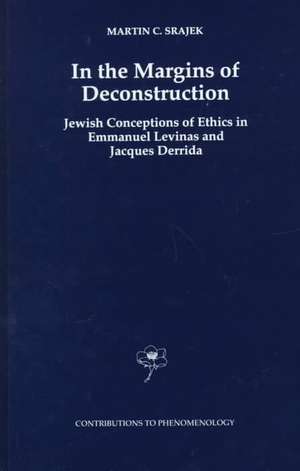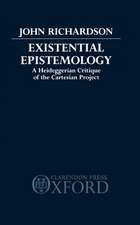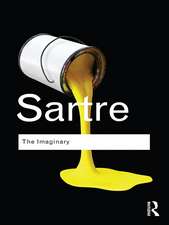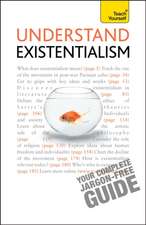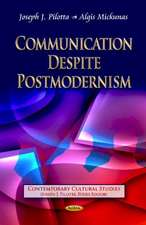In the Margins of Deconstruction: Jewish Conceptions of Ethics in Emmanuel Levinas and Jacques Derrida: Contributions to Phenomenology, cartea 32
Autor M.C. Srajeken Limba Engleză Hardback – 31 ian 1998
| Toate formatele și edițiile | Preț | Express |
|---|---|---|
| Paperback (1) | 945.14 lei 6-8 săpt. | |
| SPRINGER NETHERLANDS – 8 oct 2012 | 945.14 lei 6-8 săpt. | |
| Hardback (1) | 951.14 lei 6-8 săpt. | |
| SPRINGER NETHERLANDS – 31 ian 1998 | 951.14 lei 6-8 săpt. |
Din seria Contributions to Phenomenology
- 20%
 Preț: 630.92 lei
Preț: 630.92 lei - 20%
 Preț: 693.49 lei
Preț: 693.49 lei - 8%
 Preț: 509.67 lei
Preț: 509.67 lei - 18%
 Preț: 984.42 lei
Preț: 984.42 lei - 18%
 Preț: 1230.03 lei
Preț: 1230.03 lei - 15%
 Preț: 645.79 lei
Preț: 645.79 lei - 15%
 Preț: 657.39 lei
Preț: 657.39 lei - 18%
 Preț: 728.28 lei
Preț: 728.28 lei - 15%
 Preț: 635.96 lei
Preț: 635.96 lei - 15%
 Preț: 578.87 lei
Preț: 578.87 lei - 15%
 Preț: 638.43 lei
Preț: 638.43 lei - 15%
 Preț: 691.59 lei
Preț: 691.59 lei - 20%
 Preț: 505.32 lei
Preț: 505.32 lei - 15%
 Preț: 645.28 lei
Preț: 645.28 lei - 15%
 Preț: 637.28 lei
Preț: 637.28 lei - 18%
 Preț: 951.91 lei
Preț: 951.91 lei - 15%
 Preț: 634.00 lei
Preț: 634.00 lei - 15%
 Preț: 646.75 lei
Preț: 646.75 lei - 18%
 Preț: 727.97 lei
Preț: 727.97 lei - 15%
 Preț: 693.71 lei
Preț: 693.71 lei - 18%
 Preț: 729.06 lei
Preț: 729.06 lei - 15%
 Preț: 692.56 lei
Preț: 692.56 lei - 18%
 Preț: 778.94 lei
Preț: 778.94 lei - 18%
 Preț: 780.68 lei
Preț: 780.68 lei - 15%
 Preț: 646.62 lei
Preț: 646.62 lei - 18%
 Preț: 1231.47 lei
Preț: 1231.47 lei - 18%
 Preț: 730.35 lei
Preț: 730.35 lei - 18%
 Preț: 784.61 lei
Preț: 784.61 lei -
 Preț: 432.71 lei
Preț: 432.71 lei
Preț: 951.14 lei
Preț vechi: 1159.94 lei
-18% Nou
Puncte Express: 1427
Preț estimativ în valută:
181.100€ • 190.53$ • 150.59£
181.100€ • 190.53$ • 150.59£
Carte tipărită la comandă
Livrare economică 05-19 aprilie
Preluare comenzi: 021 569.72.76
Specificații
ISBN-13: 9780792349532
ISBN-10: 0792349539
Pagini: 288
Ilustrații: XIV, 288 p.
Dimensiuni: 170 x 244 x 19 mm
Greutate: 0.61 kg
Ediția:1998
Editura: SPRINGER NETHERLANDS
Colecția Springer
Seria Contributions to Phenomenology
Locul publicării:Dordrecht, Netherlands
ISBN-10: 0792349539
Pagini: 288
Ilustrații: XIV, 288 p.
Dimensiuni: 170 x 244 x 19 mm
Greutate: 0.61 kg
Ediția:1998
Editura: SPRINGER NETHERLANDS
Colecția Springer
Seria Contributions to Phenomenology
Locul publicării:Dordrecht, Netherlands
Public țintă
ResearchCuprins
1: The Text Reading and Revelation.- 1.1 Introduction: The Text as “Espace Vitale”.- 1.2 Levinas’ Concept of Subjectivity.- 1.3 Midrashic Ethics.- 1.4 Humans as the Irruption in Being.- 2: The absolute Cohen, Rosenzweig, Levinas: Infinite Ethics.- 2.1 God as Infinite.- 2.2 The Modern Jewish Tradition.- 2.3 Emmanuel Levinas.- 2.4 Conclusion.- Chafter 3: Agency Judaism as the Matrix Between Levinas and Derrida.- 3.1 The Language of Constitution.- 3.2 The Prophet Ezekiel in the Writings of Levinas.- 3.3 The Prophet Ezekiel in the Thought of Cohen.- 3.4 From Fragmentation to the I/Thou.- 3.5 Fragmentation and Completion.- 4: Community Phenomenology of the Face.- 4.1 Towards a Community of the Face.- 4.2 Husserl’s European Scientific Community.- 4.3 Levinas’ Critique of Traditional Phenomenology.- 4.4 Face-to-Face: The Grounding Aspect of Community.- 5: Transition.- 6: The Text Pure Presence and the Task of Translation.- 6.1 The Text and the Meaning of Presence.- 6.2 Husserl’s Infinite Task.- 6.3 The Ethics of Babel.- 7: The Absolute Apocalypse: Epistemological Exile vis-à-vis Truth.- 7.1 Apocalypse and Absolute.- 7.2 Kant’s Distinguished Tone.- 7.3 The Apocalyptic Aspect in Kant’s Approach.- 7.4 Apocalypse and Prévenance.- 7.5 The Hermeneutics of Exile in Levinas and Derrida.- 7.6 The Ethical Significance of the Apocalyptic Discourse.- 8: Agency Differentiality and Negativity.- 8.1 Apocalypse as the Critique of Negativity.- 8.2 Negative Theology in Jewish Thought.- 8.3 Derrida and Negative Theology.- 8.4 Negative Theology and Speaking About It.- 8.5 Différence and the Discourse on Truth.- 8.6 Apocalypse and the Ineffable Name of God.- 8.7 Cohen and Derrida: On the Possibility of Theology.- 9: Community Différence as Messianism, Khora, and MinimalCommunity.- 9.1 Deconstruction as Description and Prescription.- 9.2 Messianism.- 9.3 Khora.- 9.4 Community.- 9.5 Deconstructive Practice of Halakhah.- Conclusion.
